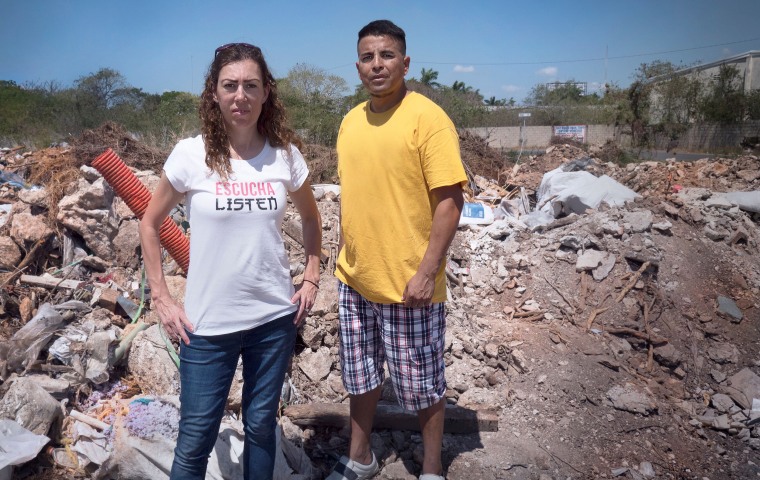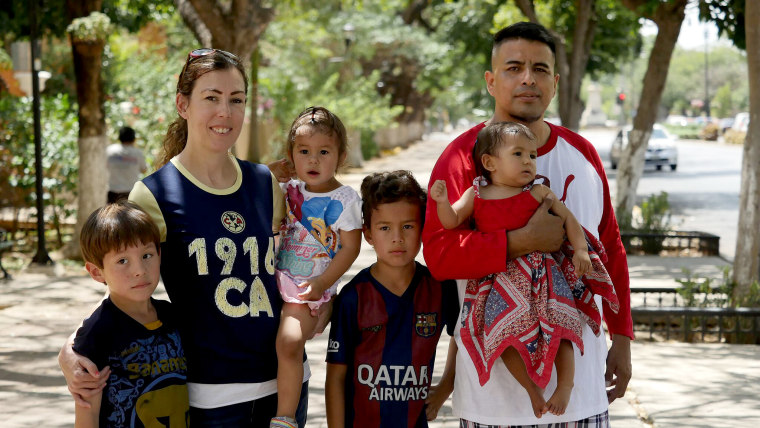A woman approaches a statue of the Virgin Mary outside an Ohio church and kneels to pray. “Here we are again,” she says aloud, in a tone that is at once respectful and weary.
“Oh Mary, I don’t know how much more of this I can take. Please, please, please.”
She recites a few prayers before imploring once more: “I can’t take it anymore.”
The woman is praying for her family to be together — a private moment captured in a new documentary, “Marcos Doesn’t Live Here Anymore.”
It tells the story of Elizabeth Perez, a decorated U.S. Marine veteran, struggling to reunite with her husband, Marcos Perez, after his deportation to Mexico.
The film follows the couple and their four children as they navigate an immigration system that offers them little hope of being together again. A portrait of a marriage as well as the human costs of deportation, it airs April 15 on PBS’ Frontline.
Elizabeth Perez, 40, served a total of 10 years in the Ohio Army National Guard and the U.S. Marine Corps, including a tour in Afghanistan. She met Marcos Perez in California in 2009 and the couple moved together to Ohio. He was undocumented, with two decades-old misdemeanor convictions in his past.
More significantly, he had previously been deported, and then entered the country again without authorization. In 2010, he was picked up at a traffic stop in Ohio by local law enforcement officials. Two weeks later, he was deported to Mexico.
The day her husband got picked up, Elizabeth Perez says in the film, “my home became a house.”
Marcos Perez’s prior deportation and re-entry triggered a provision of immigration law that barred him from coming back to the United States legally for 10 years.
The film shows Elizabeth Perez attending marches and rallies, giving speeches, and approaching lawmakers for help bringing him back. She and her husband file repeated petitions for his re-entry. They laugh, quarrel, and confide in each other on FaceTime and Skype. While she and Marcos Perez married in 2010, in Mexico, they are now in their ninth year of a physical separation that remains largely out of their control.
Twice, Elizabeth Perez moved their family to Mexico to live with him, only to return because she felt it was too dangerous for their children.
She knows that she is relatively fortunate, compared to other families.
“I’m lucky because I am a citizen and I can speak out,” she said. “What about all the families being ripped apart, where both parents are undocumented? The one left behind can’t afford to be visible and public, or they might get deported too. These are good people who just want to live and work and raise their kids. They are not criminals.”
Filmmaker David Sutherland spent several years, shooting hundreds of hours of footage, making “Marcos Doesn’t Live Here Anymore.” He did not set out to make a political film. “I am a portraitist. The issues come out of the people … I want you to feel as though you are living in their skin. I want you to care about my characters.”
Sutherland kept the ending of the film deliberately vague. “This is an evolving story; about deportation and its effects on a loving family. I hope it helps them, but really I hope it makes people think about Elizabeth and Marcos, and worry about them, regardless of politics.”
Elizabeth Perez’s situation is both unique to her and a reflection of the U.S. immigration system.

A 2018 analysis by the immigrant advocacy group American Families United estimated that as many as 11,800 military families face deportation issues. Under the Trump administration, more veterans’ requests for help on immigration are rejected than was the case under President Barack Obama, the group found.
It might surprise people to know that marrying an American citizen does not give someone the right to be here, or protection from deportation.
“That couldn’t be further from the truth,” said David Leopold, chair of the immigration group at Ulmer & Berne, LLP and past president of the American Immigration Lawyers Association. Marrying a citizen gives a person the right to apply to immigrate on a faster track. “But if someone is in the country without authorization or entered without authorization, the law does not offer a pathway even if you marry a citizen.”
There are “all sorts of rigid rules and regulations” that bar people such as Marcos Perez from obtaining legal status, Leopold explained. “Yet the thing about Elizabeth is that she has gone through so much stress and trauma and still has a positive outlook; she is still positive about the future.”
Marcos Perez’s case is complicated by the fact that he has already been deported.
According to Veronica Dahlberg, executive director of HOLA Ohio, a grassroots Latino advocacy group, there are not a lot of viable options for families when one member is deported. “The system is very brutal, and we’ve seen its effects firsthand. Many times, people just give up and decide to move on with their lives without their spouse,” Dahlberg said.
Dahlberg initially thought that if her group drew attention to Elizabeth Perez’s plight, then people in power would help, especially because she is a veteran.
“I learned that wasn’t the case at all. The people with the ability to help her quietly closed their doors and ignored her pleas. I was truly surprised,” Dahlberg wrote in an email.
Immigration enforcement is very aggressive in Ohio, Dahlberg said. Last year, Immigration and Customs Enforcement carried out one of its largest workplace raids in recent history in Salem, Ohio, at a meat processing plant. Another raid at a gardening company led to more than 100 arrests.
For now, Elizabeth Perez and her husband are waiting until the summer of 2020, when he will be eligible to apply for lawful entry. “Where we stand is the same place as at the end of the film,” she said. “We are still on the hamster wheel of trying to get him back here. It is a waiting game now.”
There is no guarantee that Marcos Perez will be approved for a visa when he can reapply. Reached by phone in Mexico, he sounded hopeful.
“After so much time, we’ve been through a lot, living here, living there … I believe things are going to change,” Marcos Perez said. “We will be ok.”

In the past, he sometimes missed his family so much he thought about crossing the border illegally again to be with them. “I was so depressed. I was sad, missing my kids … I am different now; I’m glad I didn’t. And the closer we get to 2020, every day, I am feeling happier,” he said.
Elizabeth Perez is adamant that her experiences with the immigration system have not changed how she feels about her country. At times, she has wondered whether the waiting, hoping and struggling were worth it.
“But Marcos is my husband and a human being. I feel like this deportation has controlled so many things in my life that I cannot let it control my marriage. I won’t,” she said.
“We got married for a reason,” she added. “I love him, and I want him here with us.”
FOLLOW NBC LATINO ON FACEBOOK, TWITTER AND INSTAGRAM.


